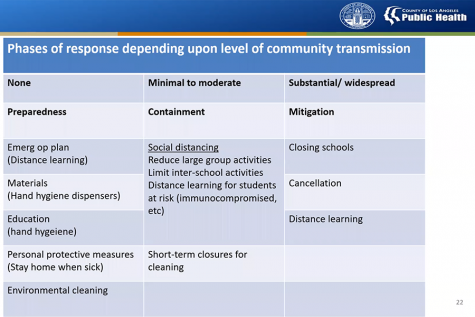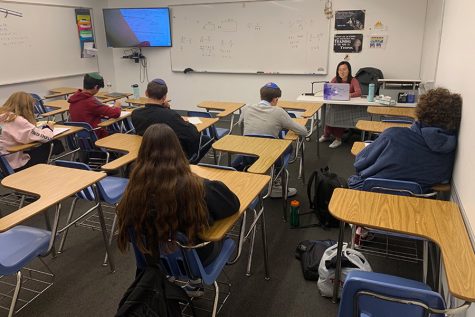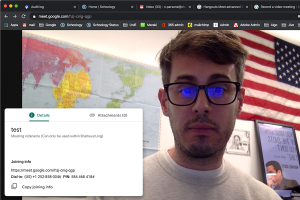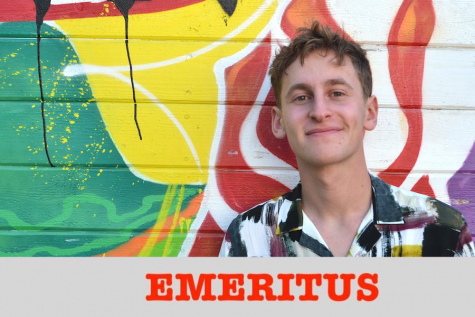County health officials tell Shalhevet webinar school closures certain, timing undecided
Public health officials say school closings can delay ‘spike’ in illnesses to conserve medical resources, but must choose the right moment
Graphic adapted by Zev Kupferman from Carl T. Bergstrom, with permission
TIMING: Health department officials who spoke to Shalhevet parents last night said wide coronavirus is inevitable, but measures such as school closures, hand-washing and social distancing could spread out new cases, giving hospitals time to keep up with the need for services.
March 12, 2020
According to Los Angeles County public health officials who are advising Shalhevet, school will not be closing for now, and any closures will be timed to have the greatest impact on slowing the spread of the virus while not overly disrupting life for students and parents.
In a live webinar for parents last night, they said that healthy students were not at risk from coronavirus, also known as COVID-19, and instead the main risk was their spreading it to their parents, grandparents and other adults.
Dr. Zachary Rubin, Chief of the Healthcare Outreach Unit at the Los Angeles County Department of Public Health (LADPH) Acute Communicable Disease Control Program, and Dr. Julie Higashi, LADPH’s Tuberculosis Controller, addressed parents via Zoom from 8 p.m to 9 p.m., moderated by Head of School Rabbi Ari Segal who asked questions of the doctors.
“What we’re trying to do with school closures is actually slow down that transmission into the community,” Dr. Rubin said. “Because studies of influenza have shown that if you actually close schools, you actually can push that spike of cases out significantly far.”
Dr. Rubin spoke for the majority of the presentation, which according to Zoom was watched by 112 parents and students.
Both Dr. Rubin and Dr. Higashi are also Shalhevet parents.
Dr. Rubin, father of 11th-graders Akiva and Yael Rubin, said that school closures were a certainty, but that the outbreak is not extensive enough yet in Los Angeles to necessitate them.
He said children were not getting sick from the illness, but that they were transmitting it to older people who could become very sick or lose their lives, and so keeping children well — especially by keeping them away from each other — would slow the spread of the illness to adults who were more vulnerable.
“Kids sometimes don’t have the best hygiene,” Dr. Rubin said, “and they like to hang out together and do all kinds of things close together, and so the virus is fairly transmissible in that population.
“And in lots of those cases kids don’t get that sick, or they get very mild illness — and they kind of take it back home and we start getting adult cases.”
A joint study by the World Health Organization and China’s version of the CDC, published in February, found that the fatality risk grew with age.
“Only 965 (2.2%) were under 20 years of age and there is just one recorded death (0.1%) in this age group,” said the study. “Most patients (77.8%) were aged 30 to 69 years. Patients aged over 80 years had a CFR of 14.8%.”
Any type of delay or prevention of the virus, Dr. Rubin said — including shutting down schools — is aimed at minimizing cases until there is available medical infrastructure to handle them.
Getting current influenza patients, which the CDC estimates there are 350,000 of this season, out of the hospital would help ensure sufficient resources to treat coronavirus patients, Dr. Rubin said, by emptying hospital beds and by giving factories time to make more supplies.
“By summer these flu patients will have gotten better and gone home and hospitals will have more room,” said Dr. Rubin. “We’re already having supply shortages with masks and gowns in hospitals; we want the factories in the U.S. to ramp up as much as possible. In summer hospitals tend to empty out a lot so we have a lot more room which gives us an ability to regenerate some of the supply…
“The goal really of this mitigation phase is not to stop transmission, it’s really to push it out further.”
As of March 11 there are 28 confirmed cases and one death in LA County, according to the LADPH website. But Dr. Rubin showed slides that showed that the disease expanded logarithmically within the population.
If more Shalhevet students get the virus, more adults who they know are likely to get it as well.
The Boiling Point has confirmed that at least two Shalhevet students who had fevers and coughs were tested and found to be negative for coronavirus. Both were among attended the AIPAC convention in Washington, D.C., earlier this month.
Asked by email before the webinar how many people have been tested at Shalhevet, Rabbi Segal said that he was “not allowed to share the answer.”
Dr. Rubin said that the true extent of the virus in Los Angeles was not clearly known, because of a shortage of testing kits, and that therefore people who did not have a fever and a cough would not be tested for the virus.
“People who have mild runny nose and those kind of things, we are not testing at this point because we feel like the yield of the testing is still low because there are a lot of [other] respiratory viruses circulating in Southern California,” said Dr. Rubin.
Dr. Rubin said that there were three phases of disease spread, to which public health officials would respond differently. The first was when disease has not yet infected the community. During this time officials work on prevention — recommending measures like increased hand-washing and staying home if sick — which would happen before an outbreak.
During a “minimal to moderate transmission phase,” which Dr. Rubin said we are currently in the middle of, large events would be cancelled and online classes could be considered for students who could be at risk, which Dr. Rubin says especially applies to students who are immunocompromised.
Lastly, during the “widespread community transmission” phase, schools could be closed.
The timing of school closures is “somewhat subjective,” Dr. Rubin said, explaining that there would be negative consequences should schools be shut down too early or too late.

FACTS: Informational slides were part of the presentation by Dr. Zachary Rubin of the Los Angeles County Health Department during last night’s live webinar. More than 100 students and parents watched the live webinar, which was livecast via Zoom.
“You want to try to get as close as you can to when the community transmission is about to blast off and start increasing, but not too late in that you miss it and the benefit is not that great,” said Dr. Rubin.
“If you do it too early, the same thing happens. You don’t get as much benefit from it and you can’t keep kids out of school forever. And then what happens is if we do it too early, then kids go back to school, and then we still have a lot of transmission in the community and then we’ve just pushed off our peak by maybe a couple of weeks.”
Dr. Rubin said the concern is not children getting sick but instead being carriers to elderly or immunocompromised people, for whom the virus would be much worse.
“Above age 70, you’re seeing a real significant mortality rate in that group, and that we’re not seeing a lot of deaths in the younger age group, especially below age 19,” said Dr. Rubin.
“I think that’s reassuring to a lot of us as parents, because our kids are not really likely to be affected in a really significantly detrimental way,” he said. “But it’s obviously very concerning because a lot of us have elderly parents at this point. And unfortunately this virus has been very, very difficult for that age group.”
Dr. Higashi said that any student who has a weakened immune system could be at risk and should consult their doctor.
“There are children who may have conditions where they have to take medications that weaken their immune system,” said Dr. Higashi, who is the mother of senior Kiku Shaw. “Anything that weakens their immune system — a heart condition, some kids have a congenital heart condition — you know your kid the best. Just consult your physician.”
Universities throughout the country — including Harvard, UCLA, Princeton, NYU and Yeshiva University — have closed in the past week. In Los Angeles, Harkham Hillel middle school closed after a parent was confirmed to have the virus.
But Dr. Rubin said that wasn’t because there was more risk there than in high schools or lower schools, but rather because it was much easier for university students to cope with the disruption.
“Colleges closing — that’s the best situation for this,– children don’t need to be monitored every minute, so it’s a little bit different that high schools and below in that parents don’t have to have a significant part of actually managing these kids,” said Dr. Rubin.
Dr. Rubin also said that Shalhevet has an advantage in being a private school, meaning that parents would not need to skip pay to stay home take care of their children during school hours.
“We’re in a little bit of a unique situation in private schools in that a lot parents have resources when they don’t necessarily really need to stay home with their kids, and miss out on lots of work,” said Dr. Rubin.
“But in a lot of the county that is the situation, where people don’t have jobs they can miss for any significant periods of time, and so it is a huge concern for the county in closing schools in general that we could impact lots of people really in a detrimental way, that can’t make money, and barely make a living week to week, and won’t be able to feed their family potentially if they have to stay home and take care of their younger children,”
Rabbi Segal also spoke himself, breaking the news that the Penn Model Congress and SAS Civil War Gettysburg trips would be cancelled later this month because of coronavirus. This means that all of Shalhevet’s “March madness” trips have now been cancelled.

EMPTY: On Thursday in Ms. Kong’s ninth-grade geometry class, only 7 of 14 students showed up. Rabbi Segal had told parents in an email the night before that if they wanted their child to stay home as an extra precaution, it would “be considered an excused absence.”
Rabbi Segal also announced in the webinar and by email that classes would begin to be broadcast for students whose parents wish for them to stay home.
“We obviously understand parents’ worries – even while we confidently stand by the advice of our team,” Rabbi Segal wrote in an email to parents, “and don’t want students to have to forego their learning due to decisions made for concerns around safety.
“As such, we’re exploring having teachers continue to teach in-person while also livestreaming the classes for those students who are not in school. We will keep you posted regarding developments on that front.”
At least 12 freshmen and six juniors were kept home by their parents today, according to a Boiling Point survey.
In addition to Gettysburg and Penn MC, Yeshiva University’s Red Sarachek Basketball Tournament and the Columbia Scholastic Press Association and Jewish Scholastic Press Association journalism conferences, all in New York City, were cancelled last week due to coronavirus.
In an email this morning, organizers of the FIRST championship, a robotics competition set for Houston and Detroit in May which Shalhevet qualified for by winning in Long Beach last weekend, announced that both events had been cancelled. As for the Poland-Israel Experience, which seniors are scheduled to leave for on May 13, it has also not been decided yet. But the similar March of the Living postponed its trip this week.

















